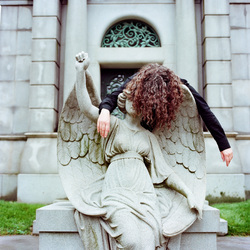 |
| Rachel Zolf Photo by Brian Adams |
Rachel Zolf (born 1968) is a Canadian poet and literary editor. She is the author of four poetry collections. Human Resources (2007) won the 2008 Trillium Book Award for Poetry and was a finalist for the Lambda Literary Award. Masque (2004) was shortlisted for the 2005 Trillium Book Award for Poetry, and the title long poem from Her absence, this wanderer (1999) was a finalist in the CBC Literary Competition. She was the founding poetry editor for The Walrus magazine and has edited several books of poetry.
Brian Teare's review of Human Resources in the Winter 2008 Lambda Book Report situates Zolf as "one of an extremely talented generation of Canadian lesbian/queer writers whose innovative cross-genre work comes to us after that of radical foremothers Nicole Brossard, Gail Scott and Erin Mouré."
She is the daughter of Patricia and author Larry Zolf.
now,
Zolf is super interesting; cynical, intellectual, relevant (at
certain extent) and most importantly, different. i always deem that
poetry (or any works that fall under the field of literature) had to
be different, or else whats the point of coming up with it?
constantly criticise and examine the notion of the world and its
arrangements of power, she came up with something ironic, hard to
decode alongside of the immense utilisation of
multilingualism which might and definitely would be foreign to
certain readers, yet interestingly caught their attention for further
readings and researches.
her
works are often considered as conceptual poetry, however her most
significant/impactful work ought to be political. Neighbour
Procedure, within its creation compiles, distiles, manipulates
and reorganizes a creatively generative framework, exploring the
world through a poet's mind with particular subjectivity on Israel
and Palestine dispute. It's construction enthusiastically centers the
usage of language and culture; in order to comprehend the first
person p.o.v decoding the real harshful chaotic meaning of war.
Language and its intercorrelation with culture, significantly shaping
one perspective towards their environment and everything which ever
comes in between.
the limits of your language are the limits of your world - Ludwig Wittgenstein (Tractatus Logico-Philosophicus, 1922).
to explore some part of Zolf's perspective on what shaped her feminist
thought as well as the process of crafting her works, here I include
the interview done with the Rusty Talk;
Kathryn
Mockler: What is your first memory of writing creatively?
Rachel
Zolf: I wrote my first poem at a workshop with Di Brandt in Winnipeg
in 1990 or thereabouts. Everyone else brought poetry and I brought a
failed essay on John Bunyan’s Pilgrim’s
Progress that stopped short
at the moment Christian became a travailer. The travailer part stuck,
though. The point not to get somewhere, but to keep slogging.
KM: Why did you become a writer?RZ: My dad hit me with his foolscap when I was a kid.
KM: What influences your work the most?RZ: My menstrual cycle.
KM: Could you describe your writing/artistic process?
RZ: I read. I think. I gather things. I make.
KM: In your recent Jacket2 article you mentioned that your work is included in a conceptual writing anthology by women but you don’t consider yourself a part of the contemporary conceptual writing movement. How would you describe your artistic or writing practice or how would you attempt to define it?
RZ: Someone called me a conceptual-materialist, which may be mutually exclusive, or not. Like Lisa Robertson, I am a feminist writer, which encompasses a fair bit, but not everything. The label never fits.
KM: You often work with pre-existing or found texts. What draws you to creating work in this way? And is it ever a problem in terms of copyright and, if so, how do you get around that?
RZ: I am a gleaner (e.g., see Agnès Varda’s film The Gleaners and I), just am. Libel law has scared me more than copyright law so far.
KM: What writers would you recommended to an aspiring writer? Or what writers were influential to you when you first started out?
KM: Why did you become a writer?RZ: My dad hit me with his foolscap when I was a kid.
KM: What influences your work the most?RZ: My menstrual cycle.
KM: Could you describe your writing/artistic process?
RZ: I read. I think. I gather things. I make.
KM: In your recent Jacket2 article you mentioned that your work is included in a conceptual writing anthology by women but you don’t consider yourself a part of the contemporary conceptual writing movement. How would you describe your artistic or writing practice or how would you attempt to define it?
RZ: Someone called me a conceptual-materialist, which may be mutually exclusive, or not. Like Lisa Robertson, I am a feminist writer, which encompasses a fair bit, but not everything. The label never fits.
KM: You often work with pre-existing or found texts. What draws you to creating work in this way? And is it ever a problem in terms of copyright and, if so, how do you get around that?
RZ: I am a gleaner (e.g., see Agnès Varda’s film The Gleaners and I), just am. Libel law has scared me more than copyright law so far.
KM: What writers would you recommended to an aspiring writer? Or what writers were influential to you when you first started out?
RZ:
I make work from what I read, and it is a different constellation for
each book. I don’t want to name names here because the list is
always exclusionary. But I do name a lot of names in my books.
KM: What is the funniest moment that you've experienced as a writer or in the literary world?
RZ: The poetry world is unfortunately not that funny. It could do with a dose of levity.
KM: What is the funniest moment that you've experienced as a writer or in the literary world?
RZ: The poetry world is unfortunately not that funny. It could do with a dose of levity.